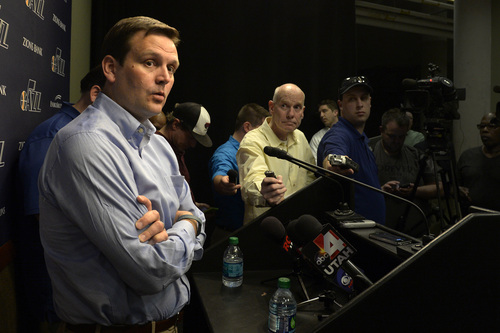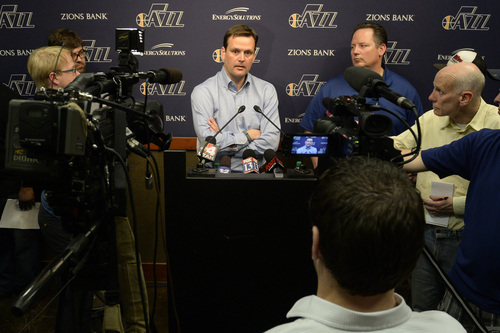This is an archived article that was published on sltrib.com in 2014, and information in the article may be outdated. It is provided only for personal research purposes and may not be reprinted.
Enough names and notations and quotations from informed corners have emerged for us to put together a healthy composite drawing of the next head coach of the Utah Jazz, what the man will look and act like. We may not know yet exactly who he is, but we have a pretty good idea of what he is. Here's the blended sketch:
• A defensive brain.
Jazz powers are straight-up sick of watching their team get kicked around at the defensive end. They've said that again and again, and it's more than sweet-sounding BS. If we all had five bucks for every time Dennis Lindsey has hammered the point, we'd all be rich enough to buy the Clippers. In the first real chance for the club to hire a head coach outside its organizational walls since … well, ever, this longtime weakness will be addressed. Defense can be taught, stressed, improved, insisted upon. Whoever the new coach is, he will think more like Tom Thibodeau than Mike D'Antoni. It's not just that defense wins championships, it's that defense prevents you from getting blown off your home floor by the Denver Nuggets and crushed on the road by the Milwaukee Bucks. It's a jumping-off point for future success.
• An appreciation of analytics.
Lindsey is too deep into metrics and measurable data for the new guy not to embrace them, too. It's like preferring logic over emotion. Some old-school coaches guide their teams more by feel than by the number, and that's acceptable, in a limited sort of way. Emotion alone, though, won't cut it. Seat-of-the-pants wisdom won't cut it. The Jazz's next head coach will have the desire and ability to understand analytics and utilize them, mixed with the aforementioned feel, to make enlightened decisions about everything from what starting lineup to favor to which offensive schemes to run to what deli to visit for lunch. He won't be a complete numbers nerd, but he'll have to be enough of a data disciple to use metrics as a means of improving the team's performance and relating to and pleasing a boss who, no doubt, will be paying close attention to them.
• A limited reach and limited hubris.
No matter how smart and capable the new coach might be, the Jazz want a team player, not a dictator. They want a coach who won't try to impose his will on everybody else. There are too many other people in the building for one new person to come in and start barking orders and making far-reaching decisions. The Jazz want evolution, not revolution. They like doing their business by committee, by consensus, with every voice heard and numerous checks and balances firmly in place. Stan Van Gundy, for instance, wanted to go to a team where he could make sweeping decisions about personnel, as well as coach his team on the floor. He did that having been burned a couple of times in the past by factors outside his control. The new coach in Utah will have input on a wide array of decisions, but he'll have to be willing to maneuver through enough points of view to understand that his voice isn't the only voice. That truth is underscored by the fact that, as Lindsey has said, the team may not even name its new coach until after the draft. So the successful candidate may have absolutely zero say regarding which players the Jazz take, whether they move up or back or out of the draft. The symbolism there is fairly thick.
• A people person.
The new guy won't have to be Frank Layden-esque. He won't have to be busting guts on the banquet circuit, or answering questions like, "What time is the game?" with memorable responses like, "Well, what time can you be there?" Still, the Jazz are keenly aware of their need through this difficult competitive transition period to put a front man up top who can speak to the masses. Jazz fans have been loyal for a long time. They've ridden the undulations of the team through triumphant and tear-jerking seasons. They deserve a coach who talks to them, who makes them feel they're an important part of what's happening, who is able and willing to communicate with them in a manner that helps them make sense of competitive trials. The longer the honeymoon with this hire, the better for the Jazz. Of course, winning, winning more games, quicker than expected is the best P.R. of all.
• An educator with energy.
It's not so much that the Jazz think they have to hire a young coach, it's that they have to hire a coach who sets a strong example of willingness to work hard to win. He'll need to use that energy to teach young players how they can make real their own abilities. Most of the Jazz's core players still have no clue how good they can be. It's the new guy's job to develop them and find those ceilings, educating them along the way. Some more experienced head coaches are gifted organizers, who manage the team for what it is. The Jazz want to hire a coach with the know-how and patience to develop individual talent and bring it forward as a team, to motivate it to play together. It's every coach's call to get the most out of the players he has.
• An ego that doesn't mind working off-Broadway.
The Jazz have said money will not be a factor or hurdle in their decision. This hire is important enough — one of the most important decisions in franchise history — not to allow a few (million) dollars to get in the way of getting the right coach. But the NBA's brightest lights rarely beam down on Salt Lake City, so the Jazz are looking for a man willing and wanting to work his tail in one of the league's backwaters. Think Jerry Sloan's plow horse over Phil Jackson's limo. They want a coach who can thrive here, and appreciate the place's unique bennies, not a coach hoping to get by and get out.
GORDON MONSON hosts "The Big Show" with Spence Checketts weekdays from 3-7 p.m. on 97.5 FM/1280 and 960 AM The Zone. Twitter: @GordonMonson





